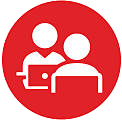Blog
How to guide your Child to overcome fear and associated behaviour

In their zest to protect their children parents often cross over the boundary between caution and fear. The list of things parents tend to protect their children are endless like – cold breeze, dogs, cars, swimming pool, cycling, crossing the road, strangers … Excessive action on this count often leads to a child whose development and enjoyment gets restricted due to fear that was induced from a very early age.
Should parents not protect? Of course they should, but within limits, as the child has to face the world ultimately and over protection leads to self-doubt due to fear.
Shivani (name changed for confidentiality) was waiting to board the flight. This would be her first flight and she was very excited about it. Her mother purchased the window seat so that she can look outside and see the sky and clouds.
Her uncle called in the evening and told Shivani to be very careful and wear the seatbelt properly. Shivani innocently asked the reason and uncle said that the pilot suddenly applies the brakes in case he comes across a bird. Also in case there is bumpy weather or a pressure drop the airplane gets very shaky. He went on to narrate an incident when the plane hit an air pocket and dropped a few meters. Everyone was scared about what was happening and that is exactly the reason why he avoided flights as much as he could.
After the call all the excitement went away for Shivani it was replaced with fear. Very reluctantly she got into the airplane. When the cabin crew started the safely demonstrations, she asked her mother if the flight was safe or not. It was a smooth flight and her mother slept off all the way. Shivani kept watching out for birds and kept checking if the seat belt was tightly in place.
At a tender age she developed a deep fear due to loss of control that then went on to influence other aspects of her life as well.
Adults must try their best to help children overcome fear that might exist innately. Fear is often associated with possible loss of control of a situation. Parents must therefore help children understand how best to bring any degree of control by developing the right skills. For instance, if a child is scared of drowning in water, parents must help the child learn swimming rather than let the fear persist.
Through the growing up process new fears keep coming up and the resulting behaviour is what the parents need to observe. For instance fear of non-performance translating into fear of examinations, fear of reprimand translating into subservience. These fears can be induced by a situation, a teacher, a friend or a well-wisher. These fears are like shackles and very restrictive for the development of the child. Parents need to stay vigilant and help the child counter these.
At Yancha, expert guides provide the much needed inputs to parents to carry out the behavioural development of the children. While schools focus on the academic development based on prescribed curriculum, behavioural development and building on the areas of interest of the child is best carried out by the parents.
The fundamental reason for children to achieve far beyond expectations is the behavioural development carried out by the parents in the formative years of their development.
Instead of fear parents must learn to induce confidence and caution in the child. Look before you leap is a good enough idea to go with.
SUBMIT COMMENTS
Blog Comments
-
No comment found.
Popular Posts
- Every Parenting Situation is Unique
- How to guide your Child to overcome fear and associated behaviour
- Decision Making - A Feeling
- Values and Compassion – YOUR Child Observes and Learns
- Reprimand - is it right thing to do?
- Is Availability of Resources the Differentiator for Success?
- How to help children to achieve their Full Potential
- Discover Ways to Stay Focused and Avoid Distractions
- Parents – Owner or Custodian of the Child
- My child is well behaved and obdedient..Why is that not enough?
- Connect with Your Child but Understand why NOT to Overdo it
- How to Actively Listen & Respond to your Child
- The Importance of Humility in Parenting
- Teaching Positive Discipline to a Child
- Positive Ways to React When Your Child Does not seem to 'Obey'



